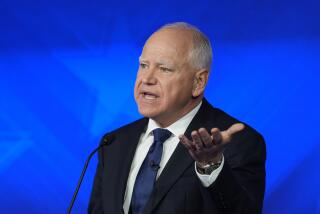Bush Faced Dilemma Over China Trip
WASHINGTON — Dial a certain telephone number in Shanghai, and a most American-sounding voice will answer: “Shanghai White House.”
Running a war while 7,462 miles from Washington--indeed, doing so in the financial heart of what President Bush has called America’s “strategic competitor”--may sound complicated. But it’s not much more difficult for Bush than picking up the handset of a secure telephone line.
And such lines, emblematic of the modern presidency, are installed for him wherever he travels, be it Chicago or China.
Not so easily addressed, however, is the challenge of leading the country from afar when anxiety runs rampant and the president is more than half a day’s travel from the Oval Office.
For Bush, there was little doubt about the importance of making the journey.
Speaking with journalists from Asian news organizations on the eve of his departure for the Asia-Pacific Economic Cooperation forum in Shanghai, he said, “Obviously, I leave at a very difficult time in my country, because of these terrorist attacks, the recent anthrax that has made it in the news.
“On the other hand, I think it is very important for me to go to not only discuss our economic interests and our bilateral interests, but to continue to talk about the war on terrorists. . . . And it’s also important for my nation to see that I leave because of--that international affairs are still a very important part of making the world more safe.”
With his emphasis on the country not bending to terrorism, the president “kind of backed himself into a corner,” said Paul Light, director of government studies at the Brookings Institution in Washington.
He pointed out that the Bush administration’s warnings last week had created the widespread impression that the nation faced imminent attack.
“On the other hand,” Light said, “we were told to go to ballgames” and live normal lives, albeit carefully.
Shadowing every president facing a foreign crisis in the last quarter of a century is the experience of President Carter. As soon as the hostage crisis began at the U.S. Embassy in Iran in 1979, Carter’s single-minded attention to the problem led to a decision not to travel for six months--and turned him into a hostage. His response was widely seen as a factor in his electoral defeat in 1980.
Perhaps exaggerating to make his point, Light said Wednesday as Bush was on his way to China: “The question is whether he should go to China or whether he should go to the first game of the Yankees-Seattle series. The question is, where should he be visible? People are nervous about just going out. It may be he’d be better here in Washington.”
Light said that Bush’s problem is exacerbated by the fact that key government aides aren’t in place in the midst of anthrax scares: There is not yet a permanent head of the Centers for Disease Control and Prevention or the National Institutes of Health; nor is Bush’s choice for assistant secretary of health on board.
That has meant that fewer people are available to handle the nuts and bolts of the crisis and to be a visible presence on television screens and in newspapers--making Bush’s presence all the more important.
On the other hand, had Bush canceled his travel at the last minute, he would probably have sent a signal that could have been at least as disturbing to the country as his departure in the midst of rising fear.
And those defending his decision to make the trip ask: How could he have assured the country that the anthrax problem was manageable if he turned back from what was seen as a very important summit hours before the meetings were to begin?
“It’s an important signal to the world that we have to go on taking care of business, with the president meeting with other heads of state,” said Kenneth M. Duberstein, who was President Reagan’s final chief of staff. “He is, after all, the leader of the last superpower in the world.
“If the terrorists are able to keep him inside Washington, inside America, they’ve succeeded in what they’re trying to do, which is isolate America,” Duberstein said. “He needs to be able to place the flag symbolically.”
James Ceaser, a University of Virginia political scientist, acknowledged that terrorists shouldn’t be able to force a president to shift his plans. Still, he said, he would have left the meeting in the hands of Secretary of State Colin L. Powell.
“There was a certain uneasiness on Sept. 11 when the president wasn’t in Washington,” he said.
As for the handiwork of the White House Communications Agency, he said:
“Modern communications, schmodern communications. It’s not the same thing.”
More to Read
Get the L.A. Times Politics newsletter
Deeply reported insights into legislation, politics and policy from Sacramento, Washington and beyond. In your inbox three times per week.
You may occasionally receive promotional content from the Los Angeles Times.










